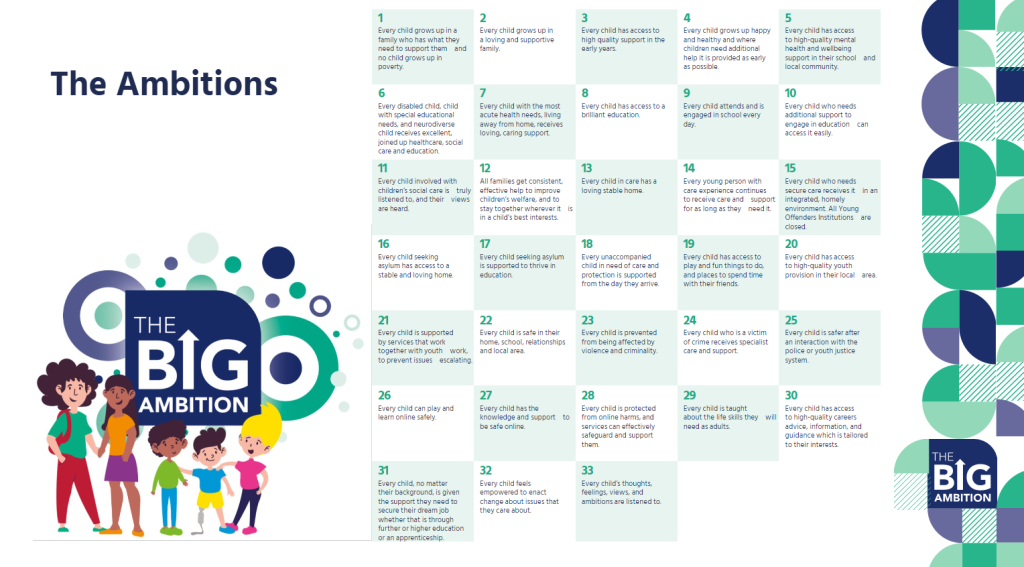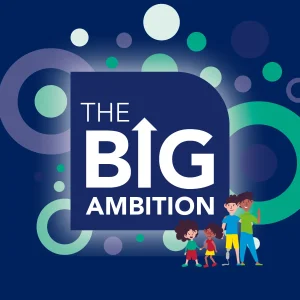Over the last three years as Children’s Commissioner, I have heard from more than one million children. I have made it my mission to listen deeply to their views, voices and experiences and reflect these truthfully to policy makers and politicians.
Too many of the children I speak to, but especially those whose voices are captured in The Big Ambition survey, feel invisible to the adults who make decisions in their lives. Just one in five (22%) of those who responded to the survey agreed that the people who run the country listen to what they have to say.
That’s why this election must be one that captures and reflects children’s lived experiences. I want party leaders to commit to listening to these voices and acting on what they are told.
The Big Ambition made clear that children are ambitious, positive and able to offer practical solutions to the barriers they face in their lives. With those in mind, I’ve set a vision for improving childhood that I’m calling on the next government to take forward, covering all aspects of a child’s life.

The Big Ambition for Education
- A razor-sharp focus on improving school attendance. Tackling school absences is my top priority – I’m deeply concerned that severe absence is reaching record highs. The Big Ambition results show that children still deeply value their education – 60% said they like going to school, but this figure is down from The Big Ask when 84% said they were happy at school or college. I’m calling on the next government to introduce a nationwide programme of attendance mentors, to work with children who are persistently or severely absent and their families.
- A register of children not in school. I am deeply worried about the number of children who are falling out of the education system altogether. The most vulnerable children are disproportionately represented among those children not in school at all – we all have a collective responsibility to tackling this. That’s why I want the next government to introduce a children not in school register and a unique child identifier, so that no child falls through the gaps.
- Breakfast clubs and free meals provided in school. Schools are often the first place children and families turn to when they need support. Thousands of schools are already playing this role, supporting families facing poverty, or other domestic challenges such as poor parental mental health. I want the next government to introduce breakfast club provision for all children who need it, free of charge for parents, and to auto-enrol children for free school meals so no child goes hungry at school.
- Better and swifter mental health support in school. When children need extra support to access education, they should receive it at the right time and in the right place. Schools need to develop strong pastoral policies and wraparound support for all children who need additional help to engage with and thrive in education. I want to see mental health services co-located in every school so children are supported throughout their time in education.
- Improved standards for children with special educational needs. Every disabled child or child with special educational needs, and neurodiverse child deserves excellent, joined up healthcare, social care and education. I am calling on the next government to make SEN Support statutory and to introduce a one school term limit on the length of time children wait to have their special educational needs assessed by a local authority.
- A commitment to eradicate child poverty. No child should grow up in poverty, worrying about where their next meal is coming from or the long hours their parents are having to work. I want to see a full-scale review of how the welfare system treats families, including considering the base rate of benefits, the removal of the two-child cap, and a triple lock for child-related benefits. This would also mean protecting all children at risk of going hungry by auto-enrolling them for healthy start vouchers and free school meals, as well as reviewing the thresholds for these entitlements, and by providing free breakfast provision in early education and school.
- A comprehensive offer of family support. Every local area should have a Family Centre which provides joined up drop-in and outreach support for families and children from birth right through to 18. Every parent should be able to access a parenting course, at key transition points in their child’s life – such as antenatally, or before the move to secondary school.
- World-class early years provision. This should start with increasing paternity leave to six weeks at 90% pay, in line with maternity leave, so families can make the choices that best suit them when it comes to caring for their children. This will mean bringing in a fully-funded early education offer for babies and children from the end of parental leave to the start of school, and recruiting additional health visitors so that no baby misses out on vital development checks and support.
- No child should be homeless – including those living in temporary accommodation. No child, whether with their family or aged 16 or 17 and living semi-independently, should be housed in B&B type accommodation for more than six weeks, including in council-owned B&Bs. There should be additional protections for families with children when it comes to being evicted.
- A unique childhood identifier. Having a single unique identifier would better enable the services supporting children and families to share information and identify where they need help. No child should fall through the gaps in the healthcare system simply because the professionals treating them only have a fraction of the information they need to care for them properly.
- Swift and timely assessments of mental health need and neurodiversity. No child should wait more than four weeks for an initial assessment of their mental health needs, and children should receive swift, multi-disciplinary assessments of any additional needs and neurodiversity within early education or school settings.
- Protecting children from the harms of vaping. Children have told me about the disruption caused by their peers vaping, and the ease at which they are able to get hold of them. I want to see the next government bring in legislation as a priority that prohibits the marketing of vapes to children and introduces strict measures to prevent their sale to children.
- Easy to access mental health support in schools and communities. When children need extra support, they often want to receive it at school – so I want mental health services to be co-located in schools to improve the speed and ease of receiving treatment. Every child should be able to access mental health support in school from a qualified, trusted adult. Additionally, open access early support hubs should be rolled out so children can access help in their communities if they prefer to do so.
- Reform the Mental Health Act to make it fit for the 21st century. The law should be reformed to ensure that the most vulnerable children, in mental health hospitals, are suitably protected and have automatic entitlement to advocacy.
The Big Ambition for Children’s Social Care
- A loving home for every child in care, for as long as they need it. Children living in care or away from home want and deserve familial, caring services with adults who they can develop trusted and stable relationships with – just like any other child. I’m calling on the next government to increase investment in recruiting and retaining brilliant foster carers who can provide loving and therapeutic homes, and building up local authority children’s homes to stop the practice of profiteering from vulnerable children’s needs. Every child should be in a home that can legally provide care – not just the lighter touch ‘support’ – whatever their age. All children should be able to stay in their homes until they are ready to leave, through a ‘Staying Put’ arrangement, rather than being made to leave at 18.
- Sufficient funding for children’s social care. A new Children’s Social Care Funding Formula should be introduced, based on an assessment of the level of need in every local area, so that intensive support to families can be offered.
- A commitment for every child to have access to an advocate, to stand up for their rights. An ‘opt-out’ model of advocacy should be swiftly introduced, so that children do not have to seek out support but are instead proactively offered it.
- A legal duty on local areas to provide early help and support to families. Legislation should be introduced to require areas to provide early help, with the necessary funding following the duty, as these early services are too often squeezed out as councils are forced to focus on those children in crisis.
- Greater support for kinship carers. Children in kinship placements can face instability if their carers are not properly supported. An improved financial support package should be made available to these carers in recognition of the vital role they are taking on and the scale of challenge they often face.
The Big Ambition for Unaccompanied Children Seeking Asylum
- Better support for unaccompanied children seeking asylum. All children arriving here should be in care, in properly regulated settings, from the day they arrive, and be able to access education and healthcare provision. This should be a guaranteed right for every child.
- Sufficient safe and legal routes for children seeking asylum. Unaccompanied children and children arriving with their families should be excluded from any cap on the number of entrants arriving in the UK via safe and legal routes for humanitarian purposes.
- Improved age assessment. Where an asylum-seeking child’s age is disputed and they are awaiting a resolution, they must be treated as vulnerable children first and foremost, until a full age assessment from social workers has taken place. Being placed with adults, often who are unknown to them, is a safeguarding risk.
- Reform of the Illegal Migration Act. No child should face the prospect of removal at the age of 18. The Act should be reformed to avoid placing children at greater risk of exploitation and abuse, due to their precarious legal status.
The Big Ambition for Safety from Crime
- An overhaul of the criminal justice system for children. A new bill should be introduced to ensure that all children who are victims of crime, or accused of a crime, are treated with due care. Children should be entitled to advocates throughout the process and there should be a Children’s Victims Code setting out their rights. Children accused of crimes should be dealt with by specialist youth courts – where after guilt is determined any next steps are agreed by social workers – and the minimum age of criminal responsibility should be raised from 10 to 14.
- All Young Offender Institutions should be closed. In The Big Ambition I heard from 390 children living in secure settings, including Young Offender Institutes (YOIs) – all of whom were consistently less positive in their responses to the survey than other children. I want YOIs closed and replaced by genuinely rehabilitative secure settings that provide stability, care and the opportunity to build trusting relationships.
- Effectively tackling exploitation and abuse outside the home. Every local area should a specialist safeguarding team to address extra-familial harms. These teams would have a specific focus on identifying and addressing the harms that children face in their wider environment, including relationship abuse, criminal exploitation and sexual exploitation. These should work closely with an expanded network of Violence Reduction Units funded to commission evidence-based interventions to reduce violence.
- An overhaul of the approach to strip searching children. Searches must happen only when absolutely necessary, with an end to the current ethnic disproportionality of their use, with all appropriate safeguards in place.
- Comprehensive support for all child victims of crime. All child victims should receive therapeutic support that is holistic and not subject to a postcode lottery. This includes creating a sustainably-funded national network of Child Houses, which provide joined up care to child victims of sexual abuse from a range of support services.
The Big Ambition for Jobs and Skills
- Improve PSHE with lessons on life skills – and make it statutory. In The Big Ambition, 61% of respondents agreed that they, or the child for whom they were responding, knew about money and life skills. Young people consistently tell my office that they want PSHE (Personal, Social, Health Education) lessons to be the most exciting and engaging lesson on the curriculum, to equip them with all the skills and knowledge they will need for adulthood. The next government should make PSHE statutory and require schools to teach lessons on issues such as economic wellbeing, financial education and careers planning.
- Better teacher training in PSHE and RSHE. I want the next government to give teachers the training they need to become experts in these subjects. I would like to see all teachers being given better and more thorough training on PSHE and a future government creating a pathway for teachers to specialise in RSHE, as they do in other subjects.
- Equip young people with great careers support. I have called on the next government to put much greater emphasis on careers in primary and secondary school. All teachers should receive basic training in the different career routes available for children and delivering the Gatsby benchmarks and every child should have regular access to careers advisors to speak to as they pick their options for post-16 pathways, learning about the workplace and the different options available to them.
- Extra support to help children with SEND or with a social worker achieve their dreams. In The Big Ambition, only 57% of children with SEND or with a social worker agreed they had the same opportunities as other children, compared to 70% of all children. I want the next government to introduce more supported internships for children most at risk of becoming not in education, employment or training. We must also do more to support care leavers to achieve their educational goals. I want care leavers to have access to year-round accommodation when attending higher education and an increase to the value of the higher education bursary available to care leavers.
The Big Ambition for Youth Work
- A national formula for funding youth provision. Children have told me how much they value play and leisure time, and need spaces to go to enjoy themselves and feel safe. We need to end the postcode lottery of youth work provision with a new system, that funds local authorities to ensure a sufficient baseline of youth provision so that children have clean places to play, pursue their interests or spend time with friends.
- A national and local long-term strategy for youth work. Universal youth work – open to all young people and delivered in a centre or elsewhere – is the basis for good youth work. I want a long-term strategy that builds local expertise and the capacity of the youth sector and fosters the trusted relationships with children and local communities on which targeted services are built.
- Review of safe places to play. As part of this new long-term vision, I want the next government to conduct a nationwide review of safe places to play. This review would be based on local child safety audits and support local improvements with a national play strategy and an investment fund.
- An expanded out-of-school offer of activities. We must do much more to give young people the enrichment activities they deserve and want. I want every child to have access to an expanded out of school offer, providing sport, drama and other activities at the end of the school day. Where families are unable to pay the cost of enrichment opportunities, schools should be able to draw upon funding to provide them free of charge.
The Big Ambition for Online Safety
- An online world that is safer by design. We need to take a robust approach to online safety, one where children’s rights are protected and their voices are empowered in the online world. The next government must introduce highly effective age assurance which prevents children from seeing illegal or harmful content online. Online platforms and tech companies should build child safety features into their apps and platforms by design – it cannot be an optional extra. Platforms should not be allowed to screen harmful content or features to child users and take active steps to reduce and mitigate the addictiveness of products for children.
- More effective processes for reporting harmful content. Children have told me that when they complain to tech companies, it often doesn’t go anywhere. I want to see much tighter processes around reporting: I want Ofcom to advocate for children and to ensure children’s concerns lead to action. We need reporting platforms to work together to tackle cross-platform issues, such as peer-on-peer abuse, bullying, and the sharing of distressing material involving children.
- Schools, parents and carers equipped to respond to difficult topics. Schools play such a pivotal role in online safety. So often teachers are the trusted adults children turn to in moments of distress. That’s why I want to see schools empowered to address difficult and emerging topics and to counter extreme views, such as misogyny and the normalisation of sexual harassment and abuse. I want parents and carers given the information they need to make decisions about children’s online lives through clear and consistent parental controls and extensive information sharing on these issues from Family Hubs and schools.
The Big Ambition for a Better World
- Child rights impact assessments conducted on every policy development. Children are optimistic and have faith that governments can transform their lives for the better – and they are right. I want children’s experiences and rights to be central to policymaking, shaped around their views and not just those of adults – this should apply to draft legislation, regulations and statutory guidance too.
- Children’s voices and views should be heard at every level of government. I want the next government to commit to consulting children on every piece of legislation and policy reform that affects them, with consultations designed to engage children and gather their views, accompanied by a child-friendly version and a strategy for engaging with children. Select Committees should hear regularly from children.
- MPs to hold direct surgeries with children. I want every elected official to establish a regular forum to hear from children about their priorities. This may include their own MP surgeries specifically for children, advertised to reach as many children from a wide range of background within their constituencies.
.






